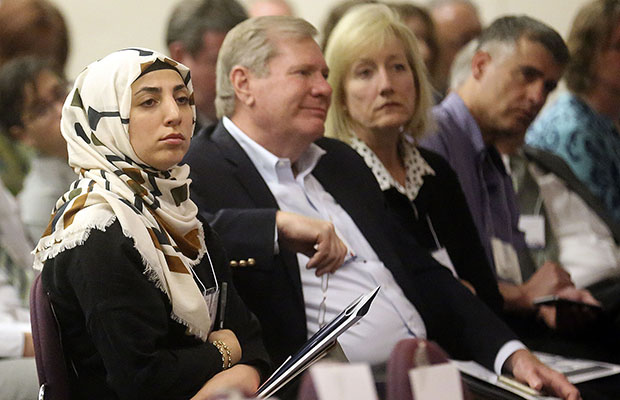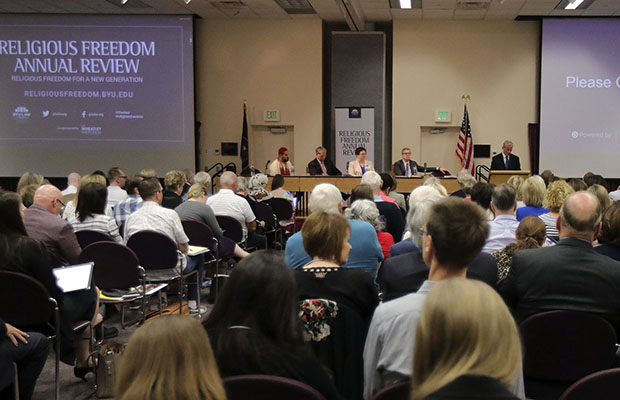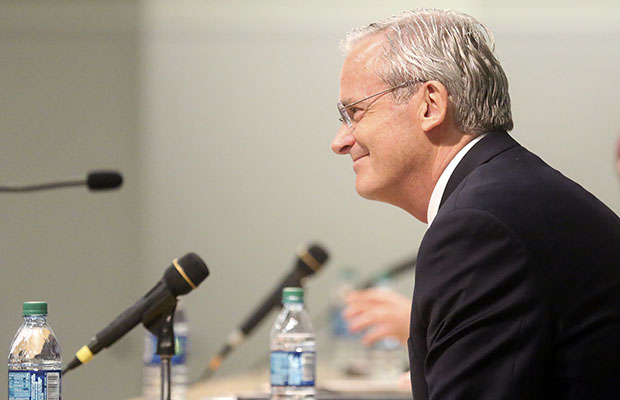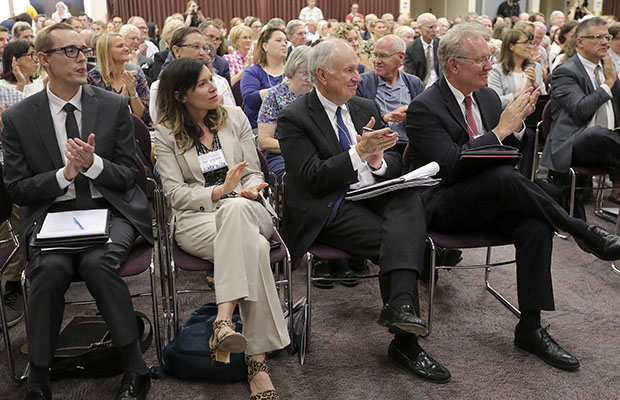Elder Kearon Calls Religious Freedom a Right and a Responsibility
Contributed By Jason Swensen, Church News associate editor

Elder Patrick Kearon of The Church of Jesus Christ of Latter-day Saints’ Presidency of the Seventy gives the keynote address at the Religious Freedom Annual Review at the BYU Conference Center in Provo on Wednesday, June 19, 2019.
Article Highlights
- Help young people understand the importance of protecting religious freedom.
- Engage, dialogue, bridge, and interact with people of all sorts.
- Demonstrate that at the heart of our faith is the desire to help our fellow human beings, wherever they are and whatever they believe.
“There is a need, and a real opportunity, for religious freedom to be framed differently and be more clearly understood.” —Elder Patrick Kearon, Presidency of the Seventy
Related Links
PROVO, UTAH
Religious liberty functions as “the heart of a society,” carrying the lifeblood “of all that is good” to the entire community.
That was Elder Patrick Kearon’s anchoring message during his keynote address at Wednesday’s opening session of BYU’s Religious Freedom Annual Review.
Sponsored by the school’s J. Reuben Clark Law School and the Wheatley Institution, the two-day gathering brings together a broad collection of religious, media, and legal leaders to examine religious freedom's place in the media, why religious freedom matters, how to find common ground with LGBTQ rights, and how to promote religious freedom in one’s community.
A member of the Presidency of the Seventy, Elder Kearon began by emphasizing the key role rising generations will have in religious liberty.
“There is a need for them to comprehend what religious freedom brings to society and what is lost when this liberty is eroded,” he said. “When young people come to understand why this freedom is crucial to their aspirations, welfare, and happiness, they will feel inspired to act to strengthen and preserve religious freedom.”
While it might appear that rights “just happen” and are automatically inherited and perpetuated without thought or effort, Elder Kearon reminded his audience it is essential to find a balance between one’s rights and one’s responsibilities associated with those rights.
“We can forget the extraordinary struggle, resolve, and sacrifice that went into protecting our abundance. We may rarely think about our obligations to keep those rights in place,” he said. People have a responsibility to protect the balance that preserves those rights.
Elder Kearon spoke of once living in a country that did not allow the free expression of religion. Such conditions continue today in many parts of the globe, contributing to ongoing refugee crises.
“These crises happen when freedoms, including religious freedom and freedom of conscience, are not protected,” he said. “Regimes target those who believe differently, force them from their homes, and uproot them in terrifying ways.
“In 2015 and 2016, from one end of Europe to the other, I saw firsthand countless ordinary people driven from their homes and lands further to the East across countries and continents in search of safety and refuge. Often their beliefs were a factor in why they were displaced.”
The world needs places of refuge from such extremism. Healthy societies run on trust, confidence, and a sense of safety. Religious freedom allows people to feel safe in expressing their deepest beliefs.
“The great enemy of religious freedom is estrangement and alienation,” he said. “When a society or government divides people based on what they believe, how they think, the words they say, whom they worship, or the manner in which they worship, common ground is lost, and life together becomes a battle.”
The test of a pluralistic society is to achieve unity “without diminishing the diversity within it.”

Elder Patrick Kearon of the Presidency of the Seventy gives the keynote address at the Religious Freedom Annual Review at the BYU Conference Center in Provo on Wednesday, June 19, 2019. Photo by Kristin Murphy, Deseret News.
Human rights divinely authored
The Church leader reminded his diverse audience Wednesday that religious freedom “means nothing” if a person protects his or her own religious practices while neglecting the practices of others—especially those who might be less secure and less able to defend themselves.
“We can’t pick and choose who gets what rights,” he said. “Every religion is susceptible to the fluctuations of prominence and obscurity. The cultural group that enjoys privilege today may lose it tomorrow, even in nations where the rule of law and democratic principles have been enshrined for centuries.”
While fundamental human rights are often inscribed in laws, constitutions, and charters, they were first imprinted “in the human heart” by a loving God, he added.
Still, “it is up to us—it is the responsibility associated with these rights—to implement, protect, and anchor them in our daily life.”
Again, Elder Kearon reminded his audience that rights and responsibilities can’t be separated without negative consequences. “The symbiosis between rights and responsibilities is often forgotten in the rush to demand that something be given to us while forgetting to foster the conditions in which that right can even be respected or have meaning.”
Rights and responsibilities can move in a “virtuous circle,” he added.
A person is more inclined to honor the right of people he or she knows personally. “Important work in religious freedom is found in walking a mile with your brother and sister, listening to a stranger talk about their religious experience, and in the gentle efforts of dialogue and persuasion.”
A challenge to embrace
Many in the rising generation are concerned about serving others in need and helping their community. They seek morality and responsibility. Many are deeply sensitive to treating people fairly and equally.
“But on the whole, the religiosity of young people is shifting,” said Elder Kearon. “They are much less inclined to identify with a particular religion, let alone attend church. They can see religion as stifling their values of inclusion and tolerance.”
Such secularization is not limited to youth, he added, and there continues to be broad fragmentations into cultural and ideological tribes.
“We can help fill this void with a positive message and constructive actions. There is a need, and a real opportunity, for religious freedom to be framed differently and be more clearly understood.”
Elder Kearon noted that society is not something that “just happens to us”—society is “something we help shape.”
“The main thing is to engage, dialogue, bridge, and interact with people of all sorts. Unless we participate, we lose our ability to both influence the world and learn from it.”

Attendees listen as Elder Patrick Kearon of the Presidency of the Seventy gives the keynote address at the Religious Freedom Annual Review at the BYU Conference Center in Provo on Wednesday, June 19, 2019. Photo by Kristin Murphy, Deseret News.
Spiritual stewardship
Contributing to the good of society is part of one’s spiritual stewardship. It was Jesus Christ who taught each of His followers, “Let your light so shine” as “a city that is set on an hill” (Matthew 5:16, 14).
“We must not cloister ourselves with others who think like us and congregations that believe like us. Jesus demonstrated how to lift society, moving deliberately to the despised, the diseased and the misunderstood, listening to and healing them.”
Elder Kearon said he’s been inspired by the many, and often anonymous, Latter-day Saints who follow their Christian impulses and serve those afflicted by fire, floods, or other natural disasters or humanitarian crises. They often partner with people of other faiths—or of no faith at all.
“We will probably need to talk more openly about these contributions, letting people know that at the heart of our faith is the desire to help our fellow human beings, wherever they are, people of faith and no faith at all, “ he said, “and that we do so without seeking converts in these most trying moments in people’s lives.”
It’s also essential that young people understand that the expression of religious belief through community services is dependent upon religious freedom. “With this understanding, they will not only value religious freedom more deeply but will courageously act to strengthen and perpetuate it.”
Concluding, Elder Kearon declared that a climate in which “we are free to believe and practice” is also a climate in which people can contribute.
“Religious freedom demands both the universal right and the universal responsibility, and it is our turn to do our part.”

Elder Patrick Kearon of the Presidency of the Seventy gives the keynote address at the Religious Freedom Annual Review at the BYU Conference Center in Provo on Wednesday, June 19, 2019. Photo by Kristin Murphy, Deseret News.

Elder Patrick Kearon of the Presidency of the Seventy gives the keynote address at the Religious Freedom Annual Review at the BYU Conference Center in Provo on Wednesday, June 19, 2019. Photo by Kristin Murphy, Deseret News.

Elder Patrick Kearon of the Presidency of the Seventy smiles at the crowd after giving the keynote address at the Religious Freedom Annual Review at the BYU Conference Center in Provo on Wednesday, June 19, 2019. Photo by Kristin Murphy, Deseret News.

Attendees applaud after Elder Patrick Kearon of the Presidency of the Seventy gave the keynote address at the Religious Freedom Annual Review at the BYU Conference Center in Provo on Wednesday, June 19, 2019. Photo by Kristin Murphy, Deseret News.
